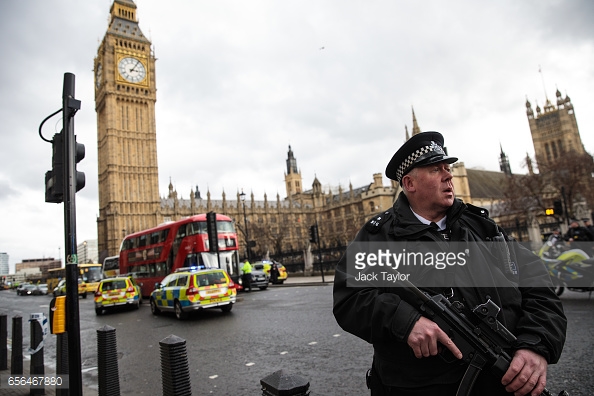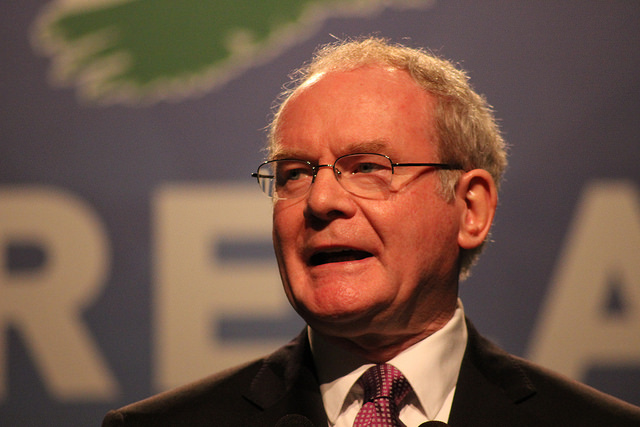The media must respond more responsibly to terrorist attacks – here’s how
Professor Richard English looks at the recent media reaction to the Westminster attack and asks whether the impact from such attacks is made greater by the publicity they receive.

Two days after the Westminster terrorist attack on 22 March, the journalist Simon Jenkins cautioned against overreaction to such assaults, claiming “the actions of the authorities and the media in response to Wednesday have ramped up the hysteria of terror”. Writing in the Guardian, he argued that:
This was ostensibly a random act by a lone player without access even to a gun. To over-publicise and exaggerate such crimes is to be an accomplice after the act. London’s response to the Westminster attack is an open invitation to every crazed malcontent to try it again.
Jenkins’s arguments raise vital questions, not least what it is about non-state terrorism that actually changes politics and society. For the historical reality is that it is not terrorism, but how we respond to it, that most decisively changes the world. Does day after day of public obsession about the perpetrator and the terrible incident offer a constructive contribution?
Terrorism historically tends not to achieve its perpetrators’ primary goals. What it does tend to do repeatedly is to achieve publicity and, through it, fear. Anyone wanting to publicise a cause swiftly and dramatically, or to find renown and redemption through political martyrdom, will have watched the aftermath to the London attack and – if anything – been encouraged to emulate it.
The situation becomes more messy and unjustifiable the more you consider it, because the United Kingdom doesn’t react to all such terrorist attacks equally. A police officer was shot in Belfast in January this year, without a fraction of the attention devoted to London’s appalling experience on 22 March. Perhaps it was the lack of fatality in Belfast that day, but prison officers in Northern Ireland have died after terrorists attacked them in recent times, receiving only marginal national coverage.
This disproportionate attention to some attacks is a gift to terrorists and their apologists, and that is made clear when looking at the varied reactions to terrorism across the globe. It is, of course, ludicrous to claim that the West is engaged in a war on the Muslim world. But when the UK media and populace react with endless obsession to Western deaths, and with comparatively muted responses to Muslim victims, then it is hard to convince people internationally – or even domestically – that UK policies in relation to terrorism are as benignly intended as they surely are.
And proportionality is a wider issue. The attack in Westminster was a merciless, unjustified assault on innocent people. But the genius of terrorism is to magnify comparatively low levels of violence into extraordinarily memorable politics.
The chances of dying in the UK as a result of stress or poor diet are far greater than the chances of being killed by a terrorist; but the terrorist threat can seem more worrying because of its easily memorable set of triggers and reminders. And those triggers become even more memorable when society decides to treat them as the UK did recently. So what is to be done?
There is a need for clear reporting of events that are as significant as a politically violent attack in London. And one of the treasures of democratic society is that it facilitates and relies upon the freedom of journalistic expression and reporting.
Keeping things in proportion
But three things are needed if the UK is to get this response to terrorism right. First, a sense of proportion is required. The reaction to the London attack was way out of tune with the political significance of the event, and utterly disproportionate when set against other threats facing the UK. Journalistic reportage needs to stress responsibly how low the threat from terrorism remains in the UK.
And when considering terrorist violence and its consequences, complete honesty is necessary. Journalists need to keep pointing out that most of the victims of Islamic State violence are Muslims, and that the spin-off violence in Western Europe is an horrific side effect, despite appalling consequences for its few victims.
Second, the media need to ensure that nothing in the coverage pressurises politicians into counter-productive over-reaction. The responsibility of politicians is to minimise the dangers of terrorist attack. And here the record has been mixed. In the wake of 9/11 there was an exaggeration in both the United States and the United Kingdom of the threat that was posed by al-Qaeda to the West.
A consequence of that was an over-militarised reaction, one part of which was the Iraq endeavour. It is important to recognise that in the mutually shaping relationship between non-state terrorists and their state opponents, the chaotic aftermath of the Iraq invasion was one of the main reasons for the emergence of IS in the first place.
Third, we need to stress the importance of high grade journalism. The reduction in the numbers of people buying high quality newspapers in Britain in recent decades has led to a diminution in the amount of first-class journalism available. Together with the digital revolution in accessing information, this has made serious minded media debate on issues like terrorism more difficult.
But there’s no need for despair about the options. There remain superb, independently minded journalists (Jenkins among them), and the supposed shift to a “post-fact” world has been exaggerated. But it is striking how often in recent times authoritative sources of uncomfortable evidence or analysis have been dismissed by politicians, with unsubstantiated assertion offered instead.
Journalism that challenges and relies on hard-tested evidence to back up its arguments must be encouraged. That is a societal choice. And it is one of high importance not merely in relation to terrorism, but to issues such as climate change, Scottish independence, Brexit, and much else besides.
In relation to terrorism itself, as a society it is important to reflect on what terrorist violence does and does not achieve. Here, the media’s role as an informing voice and as a space for discussion and for respectful, constructive disagreement is absolutely essential.
Echoes of the IRA
The waves of media coverage of former IRA leader Martin McGuinness’s life included some very valuable contributions. But much of the high-profile coverage of his transition from IRA violence to peace process politics ignored the most important aspect of that shift: namely, that McGuinness and other key Irish republicans recognised by the late 1980s that the violence which they had expected to bring them victory was in fact generating only bloodstained stalemate. Hard-headed and pragmatic, they embarked on a jagged and well-constructed journey towards more peaceful politics.

People often assume that Northern Irish politics demonstrate the victory of extremes. In fact, the opposite is nearer the truth. It was only after the IRA effectively ceased their campaign of terrorist violence that their political party Sinn Féin became the dominant nationalist grouping in the North of Ireland. And there lies one of the paradoxes of terrorism. Yes, it seizes headlines and publicity; but the longer a campaign proceeds, and the more effective the state becomes at containing it, the more difficult it is for the terrorist organisation to make progress towards its central political goals.
Like ETA, al-Qaeda, Hamas and the PLO, the IRA found that year after year of violence generated a self-sustaining and high-profile struggle. And it certainly made their cause one that enjoyed international recognition. But many people – including, decisively, many within their own community – came to find the violence repellent, and opted admirably for supporting a strong but peaceful alternative republicanism in Sinn Féin instead.
This is not a pattern that can neatly be assumed to apply elsewhere. Ultimately, every terrorist organisation is unique and must be understood as such. But, as I argued in my recent book: Does Terrorism Work? A History, it is comparatively rare for terrorists to succeed in achieving their central, primary goals.
Much more common is the securing of a diluted version (autonomy rather than independence; greater power within a state rather than secession from it), something which might be considered a partial strategic success. This can be far from negligible. But it tends not to be the cause for which the group ostensibly killed and suffered. Partial strategic success might also involve the achievement of secondary goals, whether revenge, or the sustenance of resistance into another generation.
Terrorism understandably prompts strong emotions and this can be the enemy of calm debate. But the key thing to pursue is a public discussion which makes terrorist atrocity less likely in the future. To stress that terrorist organisations are highly unlikely to achieve their goals, and to recognise that their publicity will often backfire against them politically, is a vital element of reflection.
Most important of all, journalists and politicians must aim for a proportionate and effective response rather than the polarising effects of overreacting. And it is worth remembering how strongly states can endure even determined terrorist campaigns.
Article first appeared in The Conversation.
The featured image has been used courtesy of a Creative Commons licence.




